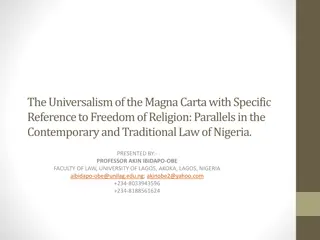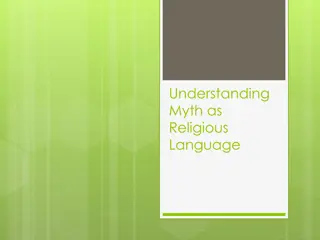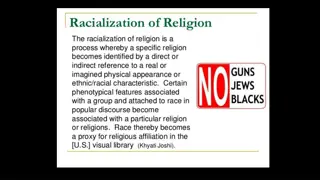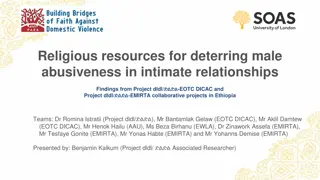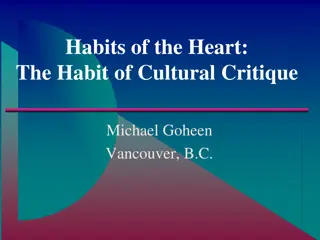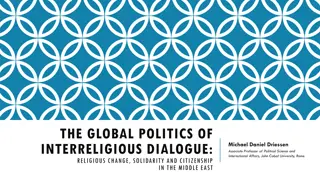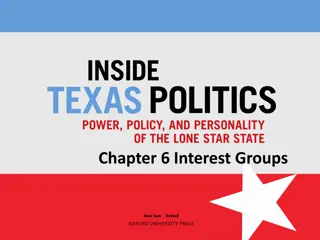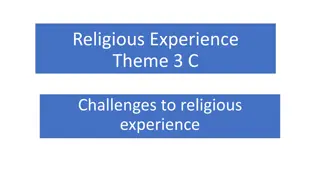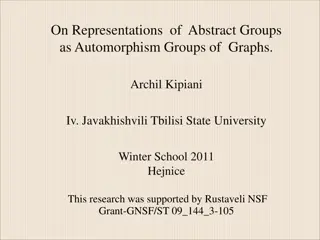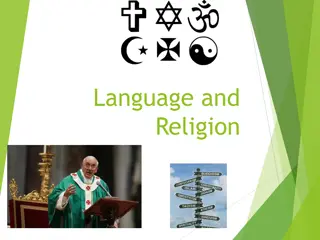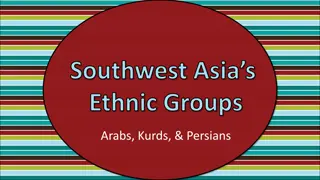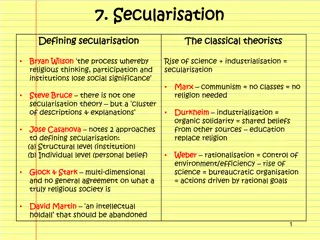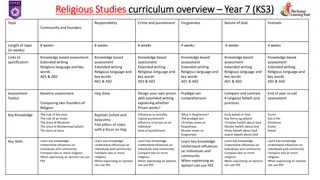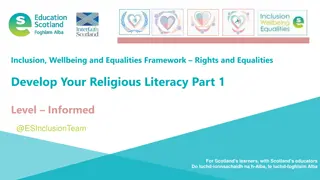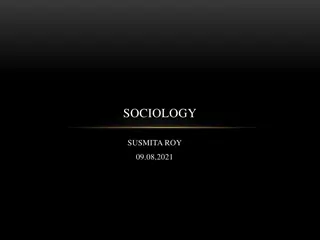Understanding Interfaith Harmony in Islamic Education
The third meeting conducted by the Islamic Education Faculty covered topics such as classroom regulations, tolerance among different religions, the concept of harmony among religious communities, and general challenges related to diversity in religious interpretations. The importance of maintaining
2 views • 13 slides
Status of Family Laws in India: Hindu vs. Religious Minorities
The family and personal status laws in India vary between Hindu law and those pertaining to religious minorities. While Hindu law has seen extensive reforms, discriminatory provisions still exist. In contrast, laws governing religious minorities have undergone fewer reforms, leading to greater inequ
2 views • 4 slides
The Universalism of Magna Carta: Freedom of Religion in Contemporary Nigerian Law
Magna Carta, a pivotal human rights document, is explored with a focus on its religious underpinnings and its influence on modern legal systems. The parallels and divergences between Magna Carta and Nigerian customary law regarding freedom of religion are examined. The implications of contemporary N
0 views • 16 slides
Religious Education Skills Progression for Years 5 and 6
This document outlines the long-term plan for the RE curriculum for Year 5 and 6 students, focusing on topics such as living by Christian values, exploring wisdom from different faiths, understanding the creation of the world, and expressing faith through art. It also covers the progression of skill
0 views • 31 slides
Religious Policies of Queen Elizabeth I: Seeking a Middle Way
Queen Elizabeth I of England navigated religious turmoil by establishing a middle way that balanced Protestant and Catholic elements. Her reign saw the passing of acts like the Act of Supremacy and Act of Uniformity to consolidate her power and create a distinct Church of England. Despite facing opp
0 views • 21 slides
Understanding Religious Conflict: Definition and Types Explored
Religious conflict is a complex and recurring concept throughout history. Scholars have defined it as disagreements between religious groups. This conflict arises from contentious issues touching on ideology, morality, power, and identity, influenced by various socio-political, economic, and cultura
1 views • 13 slides
Understanding Myth as Religious Language: Exploring Concepts and Interpretations
Explore the multifaceted nature of myths as religious language, delving into their equivocal definitions, truth claims about God, and use of rhetorical devices. Discover the significance of myths in providing human understanding of God, revealing divine attributes, and addressing fundamental questio
0 views • 17 slides
Overview of Religious Studies Course at Ramsey Grammar School
The Religious Studies course at Ramsey Grammar School for Year 9 students covers topics such as Christianity, Islam, Life and Death, Good and Evil, beliefs, practices, and church diversity. Students will be assessed through a written examination at the end of Year 11, with no coursework requirement.
0 views • 23 slides
Evolution of Akbar's Religious Policy: A Historical Overview
In the 16th century, Akbar the Great implemented a revolutionary religious policy in the Mughal Empire. Initially a devout Sunni Muslim, Akbar evolved his stance to promote harmony and equality among all religions, fostering tolerance and understanding. This shift marked a significant departure from
1 views • 25 slides
Embracing Religious Pluralism for a Harmonious Society
Educate yourself on world religions and religious oppression, empathize with religious minorities, combat generalizations, and promote belief inclusion in all aspects of life for a more just and peaceful world.
0 views • 6 slides
Religious Resources for Deterrence of Male Abusiveness in Intimate Relationships
This research project, conducted in collaboration with various organizations and experts, delves into the role of religion in deterring male abusiveness within intimate relationships. Findings suggest that religion can serve as a deterrent at both individual and normative levels, emphasizing faith-b
0 views • 9 slides
Understanding the Heart: Cultural Reflections and Religious Insights
Exploring the concept of "habits of the heart" through historical, philosophical, and religious lenses, this content delves into how human behavior is shaped by ingrained customs rooted in the core of one's being, the heart. From cultural critique to religious reflections, the narrative highlights t
0 views • 46 slides
Elizabethan Religious Settlement: Unity Amidst Division
Amid religious division in England, Queen Elizabeth I implemented a Religious Settlement in 1559 to unify the country. The settlement, a blend of Protestant and Catholic elements, aimed to maintain peace and prevent rebellions. Elizabeth's strategic compromise pleased most people, though lingering t
0 views • 14 slides
Understanding Secularism: Principles and Advantages
Secularism is the principle of separating government institutions from religious entities to ensure equal rights for believers and non-believers. It safeguards freedom of religious belief and practice, upholds religious freedom, and promotes democracy and fairness. Secularism aims to prevent religio
0 views • 21 slides
State-Sponsored Interreligious Dialogue in the Middle East: A Political Analysis
This research delves into the growth of state-sponsored interreligious dialogue initiatives in the Middle East between 2000-2020. It explores the political significance, impact on relations between political and religious authorities, and implications for religious practices in the region. The thesi
0 views • 23 slides
Understanding Interest Groups in Texas
Explore the role and influence of interest groups in Texas politics, including theories, types of groups, activities, and the impact of lobbying. Learn about incentives for joining, the free rider problem, and the various benefits interest groups offer. Discover the different types of interest group
0 views • 15 slides
Challenges to Religious Experience: A Critical Examination
Caroline Franks Davis discusses challenges to the validity of reported religious experiences, categorizing them into description-related, subject-related, and object-related challenges. These challenges question the consistency of descriptions, the influence on the subject, and the doubts about the
0 views • 21 slides
Understanding Religious Language: Cognitivism vs. Non-Cognitivism in the University Debate
This discussion explores the debate between cognitivism and non-cognitivism in religious language. Cognitivism asserts that religious claims aim to describe the world and can be true or false, while non-cognitivism argues that such claims express attitudes and cannot be verified. Flew's challenge qu
0 views • 9 slides
Guide to Using the BSA Calendar of Religious Observances
The BSA Calendar of Religious Observances is a valuable resource for scheduling scouting events in consideration of various religious holidays and observances. This guide provides an overview of the calendar, highlights important dates, and emphasizes the importance of respecting religious diversity
0 views • 8 slides
Representation of Abstract Groups through Graphs
Explore the representation of abstract groups as automorphism groups of graphs, touching on topics such as the existence of graphs whose automorphism groups are isomorphic to given abstract groups, the cardinality of connected graphs satisfying specific properties, and questions regarding the cardin
0 views • 16 slides
Understanding the Role of Language in Religion
Exploring the significance of language in religious contexts, this content discusses the functions, features, lexicon, grammar, and metaphorical aspects present in religious language. It delves into how religious language upholds spiritual beliefs, persuades believers, and expresses specific attitud
0 views • 8 slides
Understanding the Cultural Dimensions of Food and Religious Influences in Culinary Arts
Explore the impact of religious beliefs on food traditions and dietary restrictions across different cultures in the culinary world. Learn about the influence of major world religions on eating habits, food choices, and culinary practices. Discover how various religious groups, such as Christians, o
0 views • 26 slides
The Vital Role of Religious Institutions in Supporting Immigrants
Religions and immigration are interlinked in modern societies, where religions play a significant role in providing services, defending rights, and supporting the social cohesion of immigrants. Mainstream religious institutions serve as key actors in offering assistance, advocating for migrant right
2 views • 14 slides
Understanding Religious Language: Flew, Hare, Mitchell
Exploring the contrasting views of cognitivism and non-cognitivism in the context of religious language through the perspectives of Flew, Hare, and Mitchell. Delve into Flew's challenge on the undetectable gardener, Hare's concept of bliks, and Mitchell's response to the rationality of religious bel
0 views • 7 slides
Diversity of Ethnic and Religious Groups in Southwest Asia
Explore the rich cultural tapestry of Southwest Asia, home to diverse ethnic groups including Arabs, Kurds, and Persians. Learn about their shared histories, languages, and traditions. Delve into the unique religious beliefs of Arabs, Persians, and Kurds, and discover the commonalities and differenc
0 views • 30 slides
Religious Accommodation in the Army: Advising Command
The content discusses the role of the Chaplain Corps in advising Soldiers and leaders on religious accommodation in the Army as of February 13, 2019. It covers learning objectives, legal foundations, Army policies, procedures, recent changes, and references related to religious accommodation. The in
0 views • 36 slides
Understanding Religious Discrimination Laws in California Workplace
Learn about the regulations and protections under FEHA and Title VII in California, including religious exemptions, accommodation requirements, case studies, and best practices to address discrimination issues effectively. Discover the statistical insights on religious discrimination complaints and
0 views • 45 slides
Understanding Secularisation: The Decline of Religious Influence in Society
Secularisation refers to the process in which religious thinking, participation, and institutions lose their social significance. This phenomenon is influenced by factors such as the rise of science, industrialisation, changing social attitudes, and the disengagement of the church from society. Evid
0 views • 8 slides
Understanding Pressure Groups and Their Influence on Decision-Making
Pressure groups are formed by like-minded individuals to influence decision-makers by drawing attention to specific issues, with the aim of impacting legislation and existing laws. People join pressure groups seeking to address particular issues more effectively than through mainstream politics. Whi
0 views • 25 slides
Philosophers' Views on Religious Experience: Insights and Critiques
This lesson delves into the perspectives of various philosophers such as Rudolph Otto, Richard Swinburne, John Hick, and Michael Persinger on religious experiences. It explores concepts like the numinous, religious knowledge, God's existence, and criticisms on the validity of religious experiences.
0 views • 7 slides
Philosophers' Views on Religious Experience: Insights from William James
Explore William James' perspective on religious experiences, including his views on existential and value judgments. Understand how James argued for the validity of religious experiences and their potential proof of God's existence. Delve into the implications of emotions and prior beliefs on interp
0 views • 7 slides
Religious and Social Conflicts Fueling the Rise of Absolutism in Europe
Social, economic, and religious conflicts in Europe played a significant role in the emergence of absolutism where monarchs wielded supreme power without sharing it with legislative bodies. Events like Spain's religious conflicts, Protestantism in England, the Spanish Armada, religious conflict in t
0 views • 10 slides
Religious Pluralism and Civil Society: A Paradox in Government Control
Understanding the intricacies of religious pluralism in the context of government control reveals a paradox where restricting religion can hinder social cohesion and economic growth. Through insights on the counterproductivity of control, the role of religious organizations in civil society, and the
0 views • 16 slides
US Religious Freedom Restoration Act (RFRA) Overview
The US Religious Freedom Restoration Act (RFRA) aims to protect the free exercise of religion by ensuring that governments do not substantially burden religious practices without compelling justification. It emphasizes striking a balance between religious liberty and governmental interests through t
0 views • 9 slides
Religious Studies Curriculum Overview for Year 7 and 8 (KS3)
Explore various topics such as responsibility, crime and punishment, forgiveness, nature of God, festivals, community, founders, worship, creation, life after death, rules and laws, relationships in this detailed Year 7 and 8 (KS3) Religious Studies curriculum. The curriculum includes assessments, e
0 views • 6 slides
Student Interest Group Policy Changes Overview
Student Interest Group Policy Changes involve implementing new criteria for student interest groups, setting membership requirements for preclinical and clinical years, consolidating existing groups, and establishing new interest groups. The policy includes guidelines on events, fundraisers, faculty
0 views • 9 slides
Developing Religious Literacy for Educators in Scotland
This resource aims to enhance educators' understanding of religious literacy by exploring religious discrimination, core beliefs of major faiths, and additional learning sources. It encourages educators to consider the needs of learners in relation to their religious beliefs in Scotland.
0 views • 30 slides
Understanding Minority Groups in Sociology
Sociologist Louis Wirth defined minority groups as those singled out in society for differential treatment due to physical or cultural characteristics, leading to collective discrimination. Membership is both objectively ascribed and subjectively applied. Minority group status can be based on race,
0 views • 12 slides
Understanding Cyclic Groups and Discrete Logarithms
Exploring the concepts of cyclic groups and discrete logarithms in group theory. This presentation covers the definition of generators, examples of cyclic groups, important theorems related to prime orders and cyclic groups, uniform sampling in cyclic groups, and the discrete logarithm problem. Exam
0 views • 14 slides
Settling the Northern Colonies: Religious Transformation and Colonization
The Protestant Reformation led to the emergence of Puritanism in the Northern Colonies, with figures like Martin Luther and John Calvin shaping religious beliefs. The Massachusetts Bay Colony stood as a beacon of self-government and religious ideals, while dissenters like Anne Hutchinson and Roger W
0 views • 9 slides


